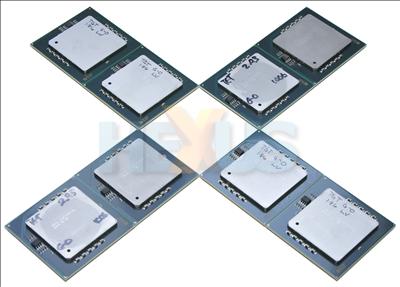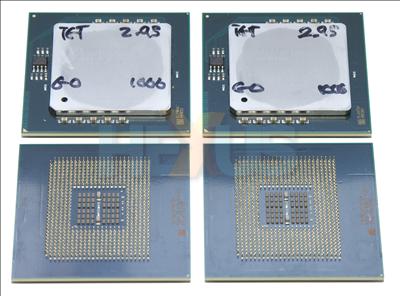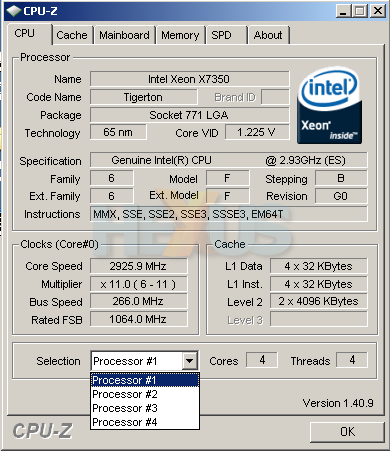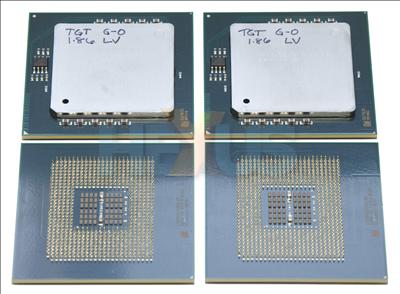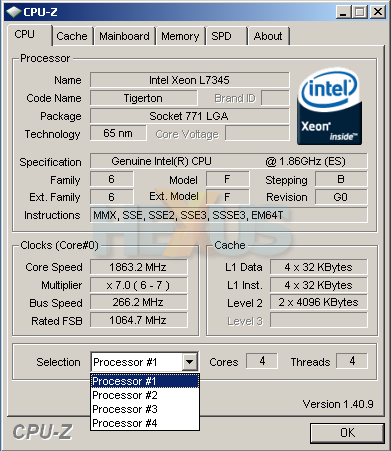Tigerton processor
Intel has launched a full range of Tigerton processors, with dual-core parts being in the Xeon 7200-series and quad-core parts in the Xeon 7300 range. So let's take a look at what's offered.
| Processor name | Intel Xeon E7220 | Intel Xeon E7210 |
|---|---|---|
| Processor speed | 2.93GHz | 2.40GHz |
| L2 cache | 8MiB | |
| FSB | 1066MHz | |
| TDP | 80W | |
| Form factor | Socket 604 | |
| Manufacturing process | 65nm | |
| Physical cores per package | 2 | |
| Inst. per clock | 4 | |
| Memory support | DDR2 FB-DIMMs | |
| Supported instruction sets | x86, x86-64, SSE-SSE3, VT | |
| Multi-chip-capable | Yes | |
| Demand-based switching | Yes | |
| Price | Still unknown |
Still unknown |
| Processor name | Intel Xeon X7355 | Intel Xeon E7340 | Intel Xeon E7330 | Intel Xeon 7320 | Intel Xeon E7310 | Intel Xeon L7345 |
|---|---|---|---|---|---|---|
| Processor speed | 2.93GHz | 2.40GHz | 2.40GHz | 2.13GHz | 1.6GHz | 1.86GHz |
| L2 cache | 8MiB | 6MiB | 4MiB | 8MiB | ||
| FSB | 1066MHz | |||||
| TDP | 130W | 80W | 50W | |||
| Form factor | Socket 604 | |||||
| Manufacturing process | 65nm | |||||
| Physical cores per package | 4 | |||||
| Inst. per clock | 4 | |||||
| Memory support | DDR2 FB-DIMMs | |||||
| Supported instruction sets | x86, x86-64, SSE-SSE3, VT | |||||
| Multi-chip-capable | Yes | |||||
| Demand-based switching | Yes | Yes | Yes | Yes | No | No |
| Price | $2,301 | $1,980 | $1,391 | $1,177 | $856 | $2,301 |
Tigerton is based on the G0 stepping 65nm Merom core - not the 45nm Penryn - and almost certainly uses the same basic dice as the Woodcrest and Clovertown processors we have seen in the Xeon 5100 and 5300-series but Intel has made some changes to the implementation that are worth investigating.
Unlike Woodcrest, the dual-core Xeon 7200-series parts have 8MiB of L2 cache. Intel has not done this by building a larger, 8MiB dual-core die but, instead, by building each dual-core Tigerton as an MCM (Multi-chip Module).
So each dual-core Tigerton contains two dice, each with the full 4MiB of cache available but only a single core enabled - the other most likely fused during manufacturing.
This means that the cores on the same package are not able to directly access each other's L2 cache in the manner that a Woodcrest can and, instead, have to traverse the front-side bus in the same way die-to-die communication occurs on the Clovertown and other Intel quad-core CPUs.
Presumably the performance hit of this arrangement is outweighed by the benefit of being able to guarantee each core a dedicated 4MiB of L2 cache to work with.
Quad-core parts follow the same basic design as Clovertown and Kentsfield, as well as the dual-core Tigertons, in that they use an MCM with two dice and two cores per dice, each with a shared L2 cache.
The high-end X7350 (2.93MHz) and E7340 (2.4GHz) have the full 8MiB of cache enabled, as does the 1.86GHz L7345 - which consumes just 50W per CPU. However, the E7330, E7320 and E7310 all have cut-size caches.
The E7330 runs at the same 2.4GHz as the E7340 but comes equipped with 6MiB of L2 cache. Previous CPUs based on Intel Core Microarchitecture, most notably the early Conroe-based Core 2 Duo E6300 and E6400 chips, have used a 2MiB variant with the full 4MiB present but half of it turned off.
It seems highly unlikely that Intel would choose to pair a 2MiB fused die and a 4MiB die, as this could lead to inconsistent performance across cores, so we're assuming that these dies are fused or microcoded to use 3MiB each.
The E7320 and E7310 parts each have a total of 4MiB, with 2MiB per core. The E7310, though, lacks Demand-Based Switching support - essentially a new name for Intel's SpeedStep. Instead, it runs at the lowest available multiple - 6x by default - and can't reduce its speed any further. The L7345 also misses out - but DBS is present in all the other SKUs in the range.
All Tigerton chips forego the land-grid array-packaging seen in Intel's single and two-socket products, instead having good old Socket 604, as used since the Prestonia-generation Xeons - but don't expect them to work in previous-generation motherboards.
Unlike many previous-generation multi-processor Xeon parts, a Tigerton CPU is not outfitted with large L3 cache, for reasons we'll examine later.
For this article we've been given the chance to look at the two most expensive SKUs - the X7350 and L7345. The X7350 is the highest-performing CPU chip in the Tigerton range and L7345 is the one with the lowest power consumption.






